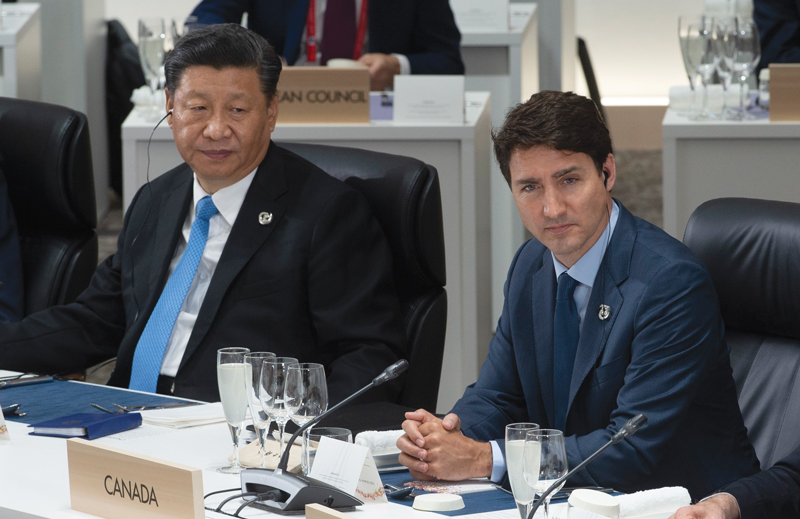
China’s operatives and hackers have been busy
Recent events have led many Canadians to understand that China has become more aggressive in pursuit of its interests.
The 33-month detention of Michael Kovrig and Michael Spavor hit home. So has Beijing’s territorial demands on its neighbours, its fishing fleet’s encroachment on other countries’ territorial waters, its illegal construction of artificial islands in the South China Sea, its threats against Taiwan and its hacking of government and corporate computer networks. All are signs of a much more aggressive China.
Recent polling demonstrates that Canadian public opinion has hardened significantly against President Xi Jinping and his government’s policies. Seventy-six per cent of respondents to a Globe and Mail/Nanos poll in October opposed Canada allowing Huawei to provide equipment for 5G networks. That figure was 53 per cent two years ago. Sixty-nine per cent said Canada should delay seeking a free-trade arrangement with China, up from 47 per cent.
Many corporate leaders used to harbour hope that a free market and an increasingly democratic China would become a big customer open to businesses ranging from manufacturing to banks and insurance companies. Those hopes have largely been dashed.
The Chinese embassy and consulates in Vancouver, Calgary, Toronto and Montreal have denounced followers of Falun Gong and intimidated students and residents who protested the stripping away of Hong Kong’s autonomy or accused China of genocide in its treatment of Uyghurs. To shut down Chinese-Canadian dissidents, Chinese officials have threatened punishment against their relatives in the mainland.
Beijing’s United Front Work Department has reportedly targeted international policy-makers, opinion leaders and media in a sophisticated and long-term effort to build support for the Chinese government’s objectives. For example, in 2021, the Conservative party alleged that China influenced federal election ridings with large Chinese populations and smeared Chinese-Canadian candidates, including Conservative MP Kenny Chiu, who claimed to have been targeted for his tough-on-China approach.
The Chinese-language media in Canada appears to be less independent than it used to be. “I cannot find a real independent and non-partisan newspaper here reporting Chinese affairs,” said Victor Ho, former editor-in-chief of the Vancouver edition of Sing Tao, a popular Chinese-language newspaper in Canada.
The United Front is said to have made sustained efforts to ensnare influential politicians, public servants and academics by inviting them to join corporate boards in China or offering financial support to policy think tanks. That is a long-range influence operation.
“Some have benefited directly or indirectly from the Chinese PRC, military-civil party, and state regime,” wrote Charles Burton of the Macdonald-Laurier Institute and a former counsellor at the Embassy of Canada to China. “Thus they become inclined to act on behalf of the regime as there is an expectation that Canadians who engage in lucrative arrangements with China show friendship toward the regime by promoting Chinese aims in Canada.
“We should consider developing an equivalent to the Australian Foreign Influence Transparency Scheme Act,” said Burton, “so that we can determine if people are speaking out in ways that are consistent with the interests of the Chinese state. Canadians should know if politically influential individuals have received benefits that could potentially influence their decision-making ability.”
Chinese intelligence agencies and China-based hackers have also been busy.
David Vigneault, director of the Canadian Security Intelligence Service (CSIS), flatly stated in 2021 that Beijing’s military and intelligence services have gathered sensitive data on Canadians, stolen key technology, and attempted to intimidate Canadians from mainland China. The country, he said, poses a serious strategic threat to Canada.
“Our investigations reveal this threat has unfortunately caused significant harm to Canadian companies,” he said. “When our most innovative technology and know-how is lost, it is our country’s future that is being stolen.”
Vigneault stressed that Beijing is “using all elements of state power to carry out activities that are a direct threat to our national security and sovereignty.”
Predictably, China has denied all charges.
“The relevant remarks of the Canadian side have no factual basis, and China firmly opposes them‚” said Wang Wenbin, spokesperson for China’s Ministry of Foreign Affairs. “We urge some politicians on the Canadian side to abandon Cold War thinking and ideological bias, stop their unwarranted attacks on China, stop spreading alarmist remarks, and do more to benefit China-Canada relations and do more to increase mutual trust between China and Canada.”
Canada needs a foreign influence transparency act
What should be done? Canada needs a foreign influence transparency act to prevent China’s further meddling. Canadian intelligence and security needs bolstering. The RCMP and CSIS need to be reorganized to focus more on China and its activities in Canada, and that means training more Chinese linguists with expertise on Chinese Communist Party tactics. And, finally, the government must cease its timid attitude toward China and its activities here and abroad. After the two Michaels affair, espionage and hacking, Ottawa should understand that China is no friend of Canada.
Advertisement












